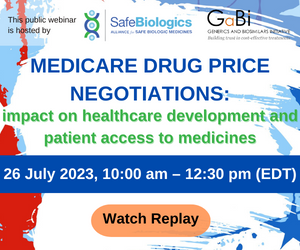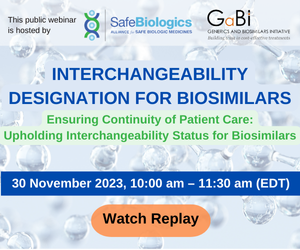ASBM/GaBI 2023 Webinar on Inflation Reduction Act
MEDICARE DRUG PRICE NEGOTIATIONS:
impact on healthcare development and patient access to medicines
26 July 2023 | WATCH REPLAY
 0
Post your comment
0
Post your comment
ASBM/GaBI 2023 Webinar on Inflation Reduction Act
MEDICARE DRUG PRICE NEGOTIATIONS:
impact on healthcare development and patient access to medicines
26 July 2023 | WATCH REPLAY

Healthcare costs around the world continue to increase to the point where affordability and access to care have become global issues affecting health policy. Much of this increase has been attributed to new healthcare technologies including new medicines. While these innovations have improved, even transformed the treatment of many diseases, their impact on the cost of care has been significant. Aggressive strategies to contain costs resulting from these innovations pose threats to access if treatments are withheld, cause withdrawal from markets where excessive price concessions are demanded, and induce diminished incentives to invest in new innovations which can further improve and transform health care.
Conflicts arise among the key participants in health care; namely the patient, healthcare professionals, health regulators and the (bio)pharmaceutical industry. All would argue in support of treatment choices that are effective, safe and accessible. There may be different points of view about affordability even if described as ‘the responsible use of resources’. Where conflicts arise is the method by which each of these objectives is achieved and sustained, and which objectives have priority over others.
This webinar examines how the Medicare price negotiation provision can be considered a type of price-setting policy, similar to the European-style price control policies applied to medicines. It also seeks to gain an understanding from healthcare providers about the perceived threat that government price setting could pose regarding access to medicines for patients.
In this online seminar, experiences with cost containment efforts in different countries (and their impact on patient care and the healthcare professional) will be discussed.
In this online event, we discussed the key elements contributing to the wide uptake of biosimilars in Europe and the US and physicians’ trust in prescribing and switching of biosimilars. Presentations of concrete examples and experiences on challenges and uptake policies of biosimilars in Europe and the current status of market access of and successful uptake measures implemented for biosimilars in the US allow us to evaluate the role of healthcare providers (physicians, pharmacists) and health policymakers in biosimilars use.
Moderator: Steven Stranne, MD, JD, Partner, Foley Hoag LLP, USA
SPEAKERS:
Michael S Reilly, Esq, Executive Director, Alliance for Safe Biologic Medicines, USA
Thomas R Barker, Esq, JD, Partner, Foley Hoag LLP, USA
Charles Clapton, Vice President, Federal Government Affairs, Gilead Sciences, USA
Matias Olsen, Public Affairs & Policy Manager, EUCOPE, Belgium
Steven Potts, PhD, MBA, Founding CEO, Anticipate Bioscience; No Patients Left Behind, USA
Professor Philip J Schneider, MS, FASHP, FASPEN, FFIP, Ohio State University, USA
Andrew Spiegel, Esq, Executive Director, Global Colon Cancer Association, USA
PANEL DISCUSSION AND Q&A:
Steven Stranne, MD, JD
Michael S Reilly, Esq
Thomas R Barker, Esq
Charles Clapton
Matias Olsen
Steven Potts, PhD, MBA
Professor Philip J Schneider, MS, FASHP, FASPEN, FFIP, Ohio State University, USA
Andrew Spiegel, Esq
Download the full programme!
Online event hosted by the Alliance for Safe Biologic Medicines and Generics and Biosimilars Initiative
US guidance to remove biosimilar comparative efficacy studies
New guidance for biologicals in Pakistan and Hong Kong’s independent drug regulatory authority
EU accepts results from FDA GMP inspections for sites outside the US
WHO to remove animal tests and establish 17 reference standards for biologicals



Post your comment